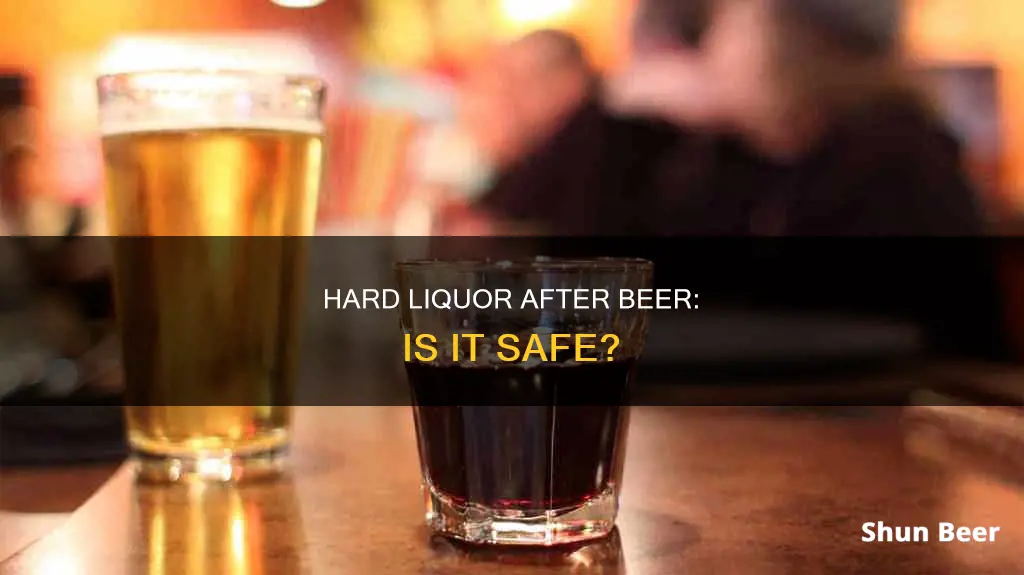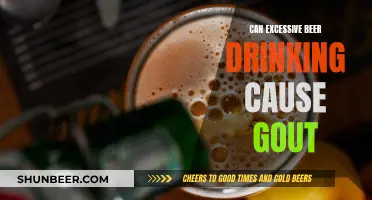
There is a popular saying that goes, beer before liquor, never been sicker; liquor before beer, you're in the clear. This saying suggests that the order in which you consume alcoholic beverages can impact the severity of a hangover. However, modern research has debunked this myth, concluding that the order of consumption does not influence a person's hangover. Instead, it is the amount of alcohol consumed and other factors such as hydration, sleep, and genetics that contribute to the risk and intensity of a hangover.
| Characteristics | Values |
|---|---|
| Whether drinking order influences hangovers | No, the order of consumption does not influence a person's hangover. |
| Whether drinking order influences drunkenness | No, how drunk a person feels depends on the total alcohol intake, regardless of the beverage mixing. |
| Whether drinking beer before liquor makes you sicker | No, it's not what you drink that will make you sick, but how much you drink. |
| Whether drinking liquor before beer makes you sicker | No, it's not what you drink that will make you sick, but how much you drink. |
| Whether drinking order matters | No, it's not what you drink that will make you sick, but how much you drink. |
What You'll Learn

The amount of alcohol matters more than the type
The idea that drinking beer before liquor can make you sicker has been a long-standing myth. The saying goes, "beer before liquor, never been sicker; liquor before beer, you're in the clear." However, this notion has been debunked by modern research, which suggests that the order in which alcoholic beverages are consumed does not significantly impact the severity of a hangover. Instead, it is the amount of alcohol consumed that matters the most.
The myth likely originated from the way we digest alcohol and the subjective experiences of drinkers. Carbonated drinks like beer and sparkling wine can irritate the stomach lining, increasing alcohol absorption rates. Additionally, people who start with liquor tend to drink less beer later, while those who start with beer may overdo it when they switch to liquor. However, the order of drinks does not change the fact that drinking too much alcohol of any kind can lead to feeling sick.
The amount of pure alcohol (ethanol) in a drink is a critical factor. For example, a Manhattan cocktail (28% ABV) and a bottle of beer may be considered equal as "one drink," but they contain very different amounts of ethanol. The volume difference also matters, as it influences how quickly we consume the drink. A beer tends to be consumed slower than a cocktail or a shot due to its larger volume. Therefore, the rate of alcohol consumption per minute is lower when drinking beer compared to cocktails.
Furthermore, a 2019 study compared the hangover severities of subjects who drank only beer, only wine, or a combination of both in different orders. The results showed that neither the type nor the order of alcoholic beverages significantly affected hangover intensity. This further reinforces the idea that it is the amount of alcohol consumed, rather than the type or order, that matters the most.
In conclusion, while the "beer before liquor" saying has persisted for a long time, it is primarily based on anecdotal evidence and subjective experiences. Scientific research suggests that the amount of alcohol consumed is the key factor in determining the severity of a hangover, rather than the type or order of drinks. Responsible drinking and moderation are crucial, regardless of the choice of beverage.
Beer and Meclizine: Is It Safe to Drink Alcohol?
You may want to see also

Carbonation in beer agitates the stomach lining
The popular saying, "beer before liquor, never been sicker; liquor before beer, you're in the clear," is a myth. The order in which you consume your drinks is unlikely to influence whether you experience a hangover the next day. However, carbonation in beer can irritate the stomach lining and increase the rate of alcohol absorption.
Carbonated drinks like beer can irritate the lining of the stomach, increasing the rate of alcohol absorption. This is because swallowing a carbonated beverage introduces air into the stomach, similar to eating or drinking too fast. This can lead to stomach pain, bloating, nausea, or a feeling of fullness. The carbonation in beer can also make people feel as if they've had more to drink than they actually have, due to the gastric filling effect of the bubbles.
Additionally, carbonated drinks can contain irritating additives such as sugar and caffeine, which can further aggravate digestive conditions like irritable bowel syndrome (IBS) and gastroesophageal reflux disease (GERD). The sugar in alcoholic mixers can also leave you feeling less than ideal the morning after a night out.
While the order of drinks may not matter in terms of hangover prevention, starting your night with liquor and transitioning to beer can help with pacing. This is because liquor has a higher alcohol content, so starting with it will lower your inhibitions more quickly and lead to drinking more. Sticking with lower-calorie options like beer can help monitor the amount of alcohol and sugar going into your system.
To avoid a hangover, it's important to drink in moderation, not on an empty stomach, and to stay hydrated by alternating alcoholic beverages with water.
Beer and Loratadine: Safe Mix or Health Risk?
You may want to see also

Drinking water helps prevent hangovers
Drinking water is a key part of preventing and alleviating hangovers. Alcohol inhibits the release of vasopressin, a hormone that decreases urine production in the kidneys. This results in increased urination, which can lead to dehydration. Drinking water before going to sleep and keeping a glass of water by your bed to sip throughout the night can help prevent dehydration. It is also recommended to drink a glass of water in between alcoholic drinks to slow the rate of alcohol consumption and reduce dehydration.
In addition to water, drinking fluids such as Gatorade and Pedialyte can help replenish lost electrolytes. However, it is important to note that drinking more alcohol will not cure a hangover, despite the popularity of the "hair of the dog" trick. This myth suggests that drinking more alcohol will ease the symptoms of a hangover, but it actually prolongs the hangover and may contribute to alcohol dependence.
While drinking water is an important strategy, it is not the only factor in preventing hangovers. The amount of alcohol consumed, eating before or while drinking, and genetics can all influence the likelihood and severity of a hangover.
Beer and Colds: Is It Safe to Drink?
You may want to see also

Drinking order is unlikely to influence a hangover
The popular saying goes, "beer before liquor, never been sicker; liquor before beer, you're in the clear." This saying refers to the idea that drinking alcoholic beverages in a specific order will reduce the risk and severity of a hangover. However, this is a myth, and the order of consumption is unlikely to influence a hangover.
Firstly, it's important to understand how alcohol is absorbed into the body. Alcohol is absorbed into the bloodstream as soon as it reaches the stomach, and by the time a hangover sets in, all the alcohol consumed will have been absorbed. Therefore, the total amount of alcohol consumed is a more critical factor in determining the likelihood and severity of a hangover than the order in which it was consumed.
Secondly, the belief that drinking beer before liquor will make you sicker may stem from the way we digest alcohol. Carbonated drinks like beer and sparkling wine can irritate the lining of the stomach, increasing the rate of alcohol absorption. However, this increased absorption rate does not necessarily lead to a more severe hangover. It simply means that alcohol is entering your bloodstream faster, but it does not affect the total amount of alcohol in your system, which is the primary determinant of a hangover.
Additionally, the saying may have originated from the observation that people tend to start their evenings with drinks that have lower alcohol content, such as beer, and progress to liquor as the night goes on. If they get sick at the end of the night or experience a hangover the next day, they may attribute it to the drinking order rather than the total amount of alcohol consumed.
While the order of consumption is unlikely to influence a hangover, other factors certainly do. These include the total amount of alcohol consumed, whether you ate before or during drinking, how frequently you drink, genetics, congeners (compounds found in alcoholic beverages), and smoking.
In conclusion, while the saying "beer before liquor, never been sicker" has persisted for a long time, it lacks scientific evidence. The best way to reduce the risk and severity of a hangover is to drink in moderation, stay hydrated, and get sufficient sleep.
Ginger Beer: A Standalone Beverage?
You may want to see also

The myth's origins are unclear
The origins of the saying "beer before liquor, never sicker" are unclear. It is a traditional myth that has been passed down through the years and has taken on a life of its own as an iconic pre-gaming anthem. The saying suggests that drinking liquor after beer can lead to more severe hangover symptoms. However, modern research has disproven this myth, showing that the order of consumption does not impact the severity of a hangover.
One theory suggests that the myth originated from the way our bodies digest alcohol. Carbonated drinks, like beer and sparkling wine, can irritate the stomach lining, increasing the rate of alcohol absorption. This can lead to a faster spike in blood alcohol levels, which may contribute to a hangover. However, this theory has been disputed, with experts claiming that it would have little effect on the likelihood of experiencing a hangover.
Another hypothesis is based on the typical drinking patterns of individuals. Many people start their evenings with drinks that have a lower alcohol content, such as beer, and progress to liquor as the night goes on. If they get sick at the end of the night or feel unwell the next morning, they may attribute it to the order in which they consumed their drinks. However, this theory does not account for the total amount of alcohol consumed, which is the primary factor in determining the severity of a hangover.
The saying has been widely popularized and repeated, despite a lack of scientific evidence to support it. It has been debunked by researchers, who emphasize that the key to avoiding a hangover is not the order of drinks but rather the total amount of alcohol consumed and other factors such as hydration, sleep, and individual physiology.
Root Canal Recovery: Beer, Yes or No?
You may want to see also
Frequently asked questions
Yes, you can drink hard liquor after beer. The order in which you consume alcoholic drinks does not matter when it comes to hangovers or sickness. What matters is the total amount of alcohol you consume and how fast you consume it.
The order of drinks does not make you sick. Drinking too much alcohol can make you sick, no matter the type or order. The amount of alcohol you drink, how often you drink, your genetics, and whether you ate before drinking are factors that can affect your risk of experiencing a hangover.
There is no chemical reaction to drinking liquor before beer that wards off hangovers. However, starting with liquor and transitioning to beer may help you monitor the amount of alcohol and sugar going into your system.
The only way to completely avoid a hangover is to not drink alcohol or to drink in moderation. To reduce the risk of a hangover, stay hydrated by drinking water, avoid rounds, drink in moderation, get enough sleep, and make informed drink choices by opting for drinks with lower alcohol content.







